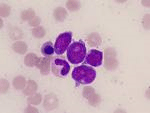Cancer immunotherapy is the use of the immune system to reject cancer. Gammadelta (γδ) T cells are an immune cell found within epithelial tissues. Epithelial tissue is found throughout the body. It is present in the skin, as well as the covering and lining of organs and internal passageways, such as the gastrointestinal tract. Epithelial tissues are also a prominent component of glands, such as prostate gland. γδ T cells play unique and critical roles in recognition of damage or disease in epithelial tissues and provide a crucial first line of defense.
 Unlike the alphabeta (αβ) T cells of the immune system (that are launched on a search-and-destroy mission when the skin suffers a cut or other damage), most γδ T …
Unlike the alphabeta (αβ) T cells of the immune system (that are launched on a search-and-destroy mission when the skin suffers a cut or other damage), most γδ T …
Adipose tissue (fat tissue) is currently recognized as an endocrine organ similar to thyroid and pancreas, due to their ability to secrete hormones such as leptin and estrogen and estrogen that could affect metabolism, inflammation and cancer progression. We now know that tumor growth is regulated by interactions between tumor and their tissue microenvironment, such as fibroblasts, immune cells and the extracellular matrix.
Adipose tissue secretes a variety of cytokines, referred to as adipokines. Most adipokines, such as tumor necrosis factor-α (TNF-α), interleukin-6 (IL-6) and leptin, are pro-inflammatory. One prominent exception is adiponectin, an anti-inflammatory and anti-cancer adipokine, which promotes insulin sensitization and protects cardiovascular tissue from ischemic injury. Pro-inflammatory adipokines can increase chronic low-grade inflammation in adipose tissue. Tumor-associated adipocytes (fat cells) also contribute to inflammation. Inflamed tumor-associated adipose tissue …